Despite the fact that Pastor Ramtin is no longer in Iran, we felt this story was too important not to share. Below you’ll read about the martyrdom of his father and the long history of faithful Christian witness of Pastor Ramtin’s family in Iran. VOM Korea supports Christians who remain in their country amid difficult circumstances, but with North Korean and Eritrean Christians we have seen God use Christian refugees as a vital link in a ministry plan that no one could have imagined ahead of time. So let’s pray that for Pastor Ramtin and his family.
A LEGACY OF COSTLY FAITH
A LEGACY OF COSTLY FAITH
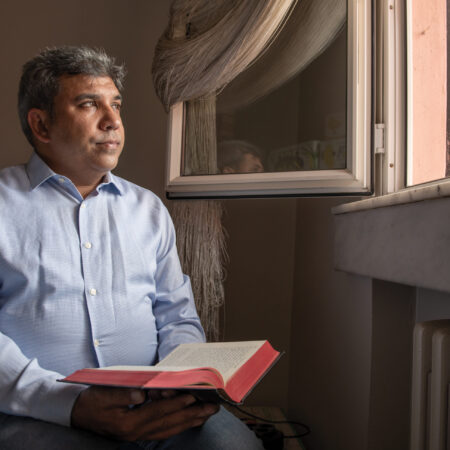
While watching a movie one evening in January 2021, Pastor Ramtin Soodmand and his wife, Mitra, were surprised by a knock at the door. When Ramtin answered, 16 plainclothes intelligence officers rushed into the apartment that the couple shared with their two children in Tehran, Iran.
The officers immediately confiscated Ramtin’s and Mitra’s cellphones and ordered Mitra to put on a head covering and long coat, as required by Iranian law for women in the presence of non- relatives. Then, the officers shut the windows and closed the curtains so the neighbors could not hear or see what was happening. An intelligence officer filmed everything as they began rifling through the couple’s possessions.
The officers ransacked the house, taking boxes of Bibles, Christian books, cellphones, laptops and anything else that might be useful to their investigation.
The officers explained that they knew Ramtin was a key leader in the secret Iranian church and that they could make him a “legitimate” pastor. They offered him his own church, including a building for worship services. But while the church would be allowed to meet openly, it would have to adhere to government directives, and the congregation would consist of people handpicked by the government. “We can help you to be famous as a pastor in Iran, a pastor who has his own legal church,” the officials said.
The officers told Ramtin that he would represent Iran at religious conferences all over the world, though he would be required to parrot the government’s talking points. Ramtin would tell the world that the church in Iran has complete religious freedom and that people of all backgrounds, including Muslims, are free to join. “There are many pastors inside Iran and outside Iran who cooperate with us,” the officers told him. “You are not the first person. This is a good opportunity for you to improve your lifestyle.”
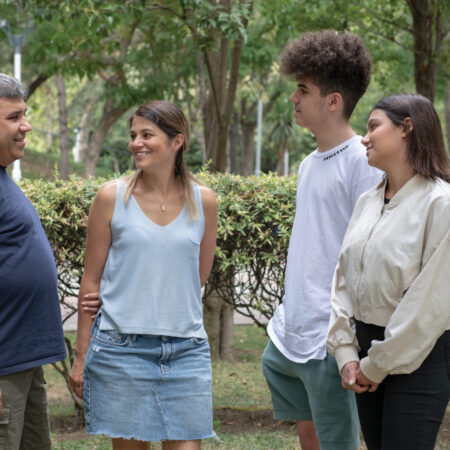
Ramtin, his wife and their two children
Having finished their pitch, the officers reminded Ramtin that he would be arrested if he did not cooperate. For clarification, Mitra asked if they were being asked to spy. “If so,” she told them, “We aren’t those kinds of people.”
The officers then told the couple that they had two minutes to discuss their offer and make a decision: either Ramtin would be arrested immediately or he would appear two days later at their office to begin his work with the government.
Both Ramtin and Mitra knew that Ramtin could probably not endure prison or torture; he struggled with diabetes and heart problems. “I am with you whatever you choose,” Mitra told her husband.
The couple signed a document stating that Ramtin would meet with authorities in two days. Then, five hours after storming into their home, the officers left at 2 a.m.
But Ramtin had no intention of accepting the government’s offer. He had agreed to the meeting only to avoid immediate arrest. “I cannot cooperate with the devil army,” he said.
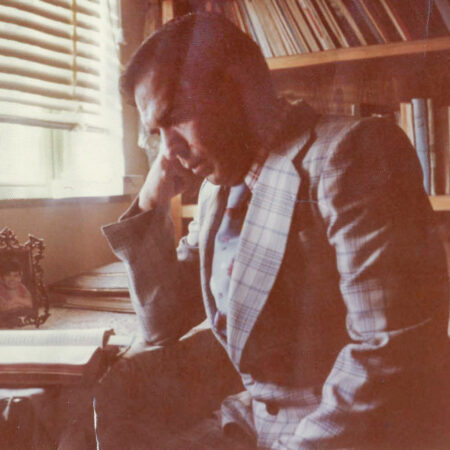
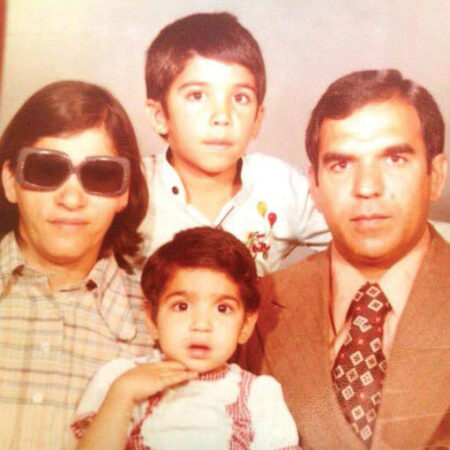
Ramtin’s father, the Rev. Hossein Soodmand, was the first Christian convert from Islam to be executed in Iran for apostasy
Take My Place
The family was thrown into turmoil. Ramtin knew what he would face if he refused to work for the government as a puppet pastor; he had previously spent more than nine weeks in prison and 40 days in solitary confinement for his Christian work. He was not afraid of prison, but he was concerned for his family. His son, Rayan, was a few months from completing his junior year of high school, and Ramita was a college student.
Experience had taught Ramtin how cruel the Iranian regime could be. He was 16 when his father, the Rev. Hossein Soodmand Radkani, was executed by the government for apostasy. After his father’s death, Ramtin’s blind mother was left to care for him and his three siblings alone. (Ramtin’s older sister, Rashin, struggled to forgive her father’s killers but eventually began to serve the Iranian church through online counseling and discipleship from outside the country. Her story is told in our February 2019 magazine.)
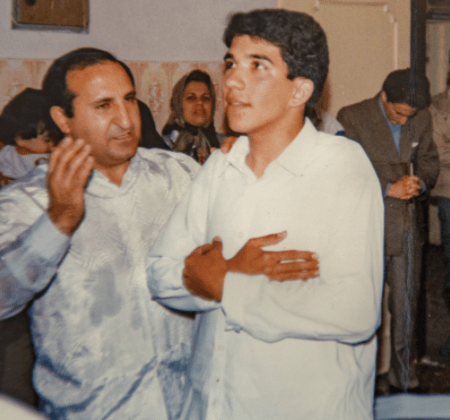
Ramtin was baptized as a teenager by Haik Hovsepian, an Armenian pastor who was killed by the Iranian government in 1994.
Ramtin had seen the Iranian government, one of the most repressive in the world, intimidate, harass and imprison Christians throughout the country. Since Iranian law forbids any Muslim from leaving Islam, Christian converts face jail time on charges such as “propaganda against the regime” and “acting against national security.” Even owning a Bible and talking about Christ are punishable offenses.
Christian activity has been illegal since the founding of the Islamic Republic of Iran in 1979, and Christianity’s continued growth has caused great concern among the country’s leaders. Despite intense persecution, the church in Iran remains one of the fastest growing in the world. Between 2009 and 2012, authorities closed nearly all Farsi-speaking churches in the country, and Christians who had been arrested and released on bail were recalled to serve prison sentences.
Ramtin, aware of the risks, had cautiously labored on behalf of the church in Iran for three decades. As a leader in Iran’s house church movement, he was involved in many illegal activities, including sharing the gospel, teaching new believers and training church leaders. He and other house church leaders had developed careful methods of working one on one so that if one Christian was arrested, he or she could not expose the whole network.
But now it seemed the government had lost its patience with his illegal evangelical work and was putting a stop to it.
Foreseeing the possibility of his arrest or death, Ramtin had prepared for this moment. Two years earlier, he had told the director of an Iranian theological seminary that he wanted to coach others to take over his work.
“I do not know how long I have to live or what persecutions might come across my path,” he had told the director, “but if this happens or if they put me in prison, I would like to prepare several people for the work of the Lord. I would like to pass on to them a knowledge of all my methods and experiences of ministry so that in my absence they can take my place and continue with the work of the Lord in order that the work of the house churches will not cease.”
Ramtin chose several committed believers for his special commission and began to train them to take his place. He had two years with them before Iranian intelligence officers upended his family’s lives in 2021.
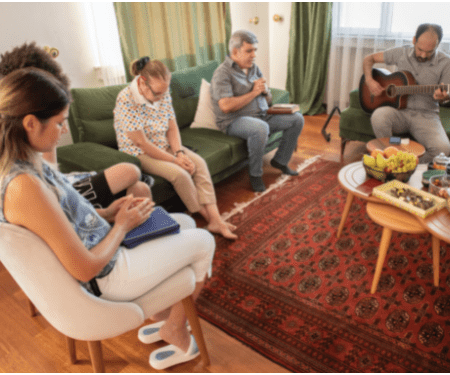
Ramtin and his family, some of whom are shown here, now worship in a house church, just as they did back home in Iran.
Following God’s Lead
After the officers left their house that January morning, Ramtin and Mitra had to assume that a recording device had been hidden in their home. So instead of openly discussing their thoughts about how to proceed, they painstakingly wrote and exchanged notes while deciding what they should do. It was an agonizing choice: Ramtin has a deep love for Iran, and he had fostered that same love for the country in his children. He knew they would lose a lot if they left, but when he asked them what they thought, they said, “Dad, do according to how God leads you.”
The family agreed that Ramtin would not meet with the authorities as promised but instead would flee the country. So the next day, he and Mitra wandered around the city looking for someplace private to talk. They knew they were being followed, and even an embrace could tip off their followers that Ramtin was fleeing.
Finally, they found enough privacy to say goodbye and went their separate ways in full hope of reuniting outside the country. Ramtin made the necessary arrangements on his own and was soon smuggled out of Iran, and his wife and children were able to leave several months later.
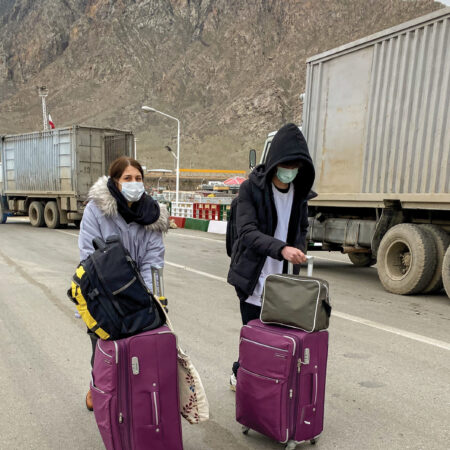
Ramtin’s family fled from Iran with only what they could carry. They are now refugees in another country.
“I am safe now. I am happy about that, but safety is not a main reason for life for me.”
A few weeks after arriving in another Middle Eastern country, Ramtin, full of emotion, spoke with VOM. “I am not sure about my decision — am I wrong or right?” he said. “All day I pray, asking God, ‘Is this the right position now?’ It is a very tough situation for me. I am safe now. I am happy about that, but safety is not a main reason for life for me. Being in the will of God is important for me and my family.”
While ministering in Iran, most of Ramtin’s work remained anonymous. But he knew that organizations like VOM were working alongside him, helping his family relocate when their landlord kicked them out for being Christians, supporting his family while he was in prison, and providing Bibles and other assistance.
“You suffered spiritually and financially with my family and me during the last 30 years and six months,” Ramtin said. “Thank God for this big family; thank God for His love that connected us in one body.”

